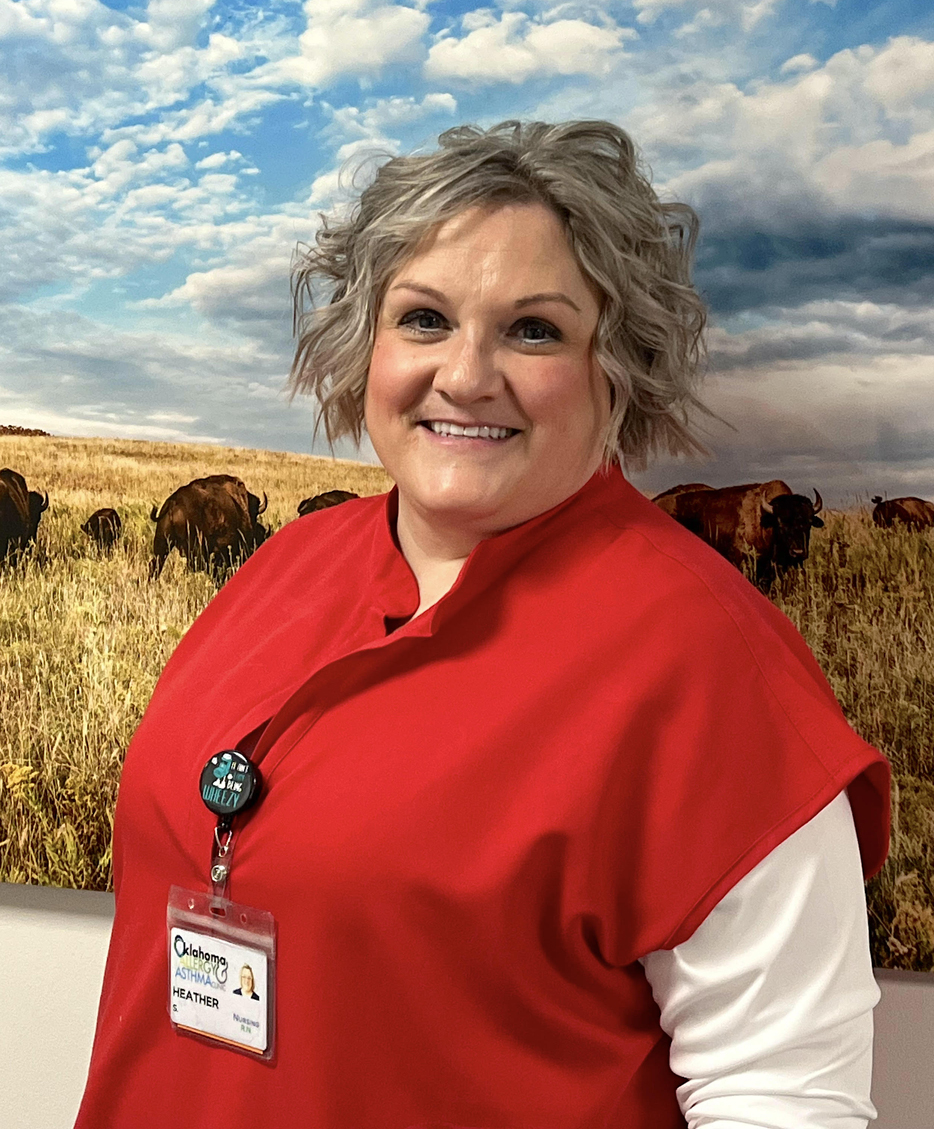
Heather Sweeney, RN
Improves the lives of others – Oklahoma Allergy & Asthma Clinic.
story and photo by James Coburn, Staff Writer
Heather Sweeney returns home at night being grateful for a career that improves the lives of others.
“It feels good and sometimes it’s humbling,” said Sweeney, RN, Oklahoma Allergy & Asthma Clinic.
Sweeney was a medical assistant when she got married 23 years ago. She wanted to be part of a team of compassionate and caring nurses. Compassion is the main reason people become nurses, she said.
It often touches her heart to see children enter immunotherapy treatments for peanut allergies. The children come to the clinic every two weeks for nine months.
“A year later they come in and they’re tested for peanuts and they’re not allergic,” Sweeney said. “You become very close to those families because you see them every two weeks. I get emotional because it’s moving to see they can do something like that and be a part of that journey.”

Sweeney entered healthcare as a pharmacy tech before staying home as a mom. Once her children were grown, she gave more thought to becoming a registered nurse. At age 35, she earned her Associate degree in Nursing at OSU/OKC followed by her Bachelor of Science in Nursing degree at Southwestern Oklahoma State University, located in Weatherford. After graduating in December of 2019, she went to work at the Oklahoma Heart Hospital before COVID hit in March of 2020. She worked there until November of 2021 before joining the PACU at SSM Health St. Anthony Hospital until the following May.
“I was ready for a clinic job and this one happened to be open,” Sweeney said. “It was probably the best decision I’ve made as a nurse. I like this field and the entire aspect of allergy and asthma. It’s not just environmental allergies. It’s food allergies and we get to help all kinds of people. So, it’s been interesting learning about all of that and expanding my knowledge as a nurse being not just in a hospital but being in a clinic to help people.”
Her career at the Oklahoma Allergy & Asthma Clinic is in a family-friendly environment among both the staff and patients, she continued. She has the benefit of working with knowledgeable doctors who are willing to teach her. There is a lot of longevity among the nursing staff, which is rare to find, she mentioned.
“They’re knowledgeable, so they’ll teach you as well,” she said. “I really like working here.”
A typical day for Sweeney involves preparing patients to meet with their physicians by taking vitals to document the patients’ visits. Patients may be prepared for patch testing or whatever else is required.
“Sometimes we do food challenges or oral immunotherapy where we up dose kids on peanuts or whatever they’re allergic to. It varies but we stay pretty busy,” Sweeney explained.
Asthma can be serious enough to cause death, so educating patients is vital. She has met people who previously did not get proper education before coming to the clinic. It may be that they did not learn the proper use of inhalers which can make a major difference in their health. When and how to use an inhaler can improve outcomes.
“Especially in kids who play sports and things like that. I think knowledge is power. The more you know about it, the better you take care of yourself,” she said. “I think that’s one area our healthcare lacks — we don’t educate people enough when it comes to their health.”
Depending on the severity of the asthma problem, some adults and children will only need a rescue inhaler to be taken before they exercise. Other people with full-blown asthma will need a daily inhaler.
“As long as people are using those inhalers correctly, most people do fairly well with asthma,” Sweeney said.
Allergy shots can help people feel better. Even using a nose spray can help allergy patients relieve some of their symptoms, she added. School teachers can also help their students by becoming aware of the signs of asthma, she said. When problems are reoccurring, patients can contact their primary care doctor for a referral to a specialist for evaluation.
Educating professionals in the field of nursing is a continual process. And that works well for Sweeney, who is a people person and likes to talk, she said.
“In the state of Oklahoma, they don’t make you take continuing education classes if you work more than 500 hours a year,” Sweeney said. “So, it’s really up to you as a nurse to stay up on what’s new and coming out.
Doctors at the Oklahoma Allergy & Asthma Clinic provide occasional classes for nurses while discussing what’s on the horizon in healthcare. Sweeney also likes reading articles to stay informed. She’s interested in becoming a certified asthma educator.
“I really like this job. I think there are so many areas that you can teach and educate,” she said.
For more information about the Oklahoma Allergy & Asthma Clinic visit https://oklahomaallergy.com/about/join-our-team/













